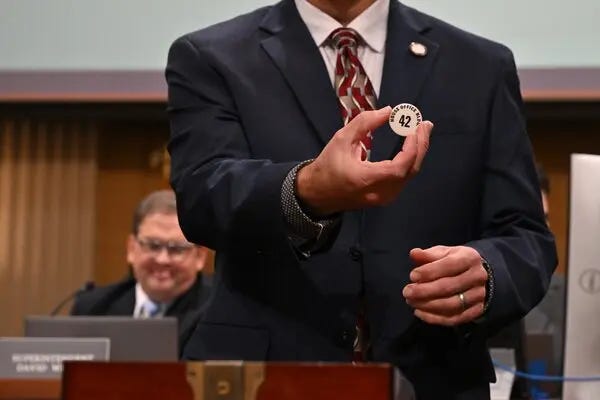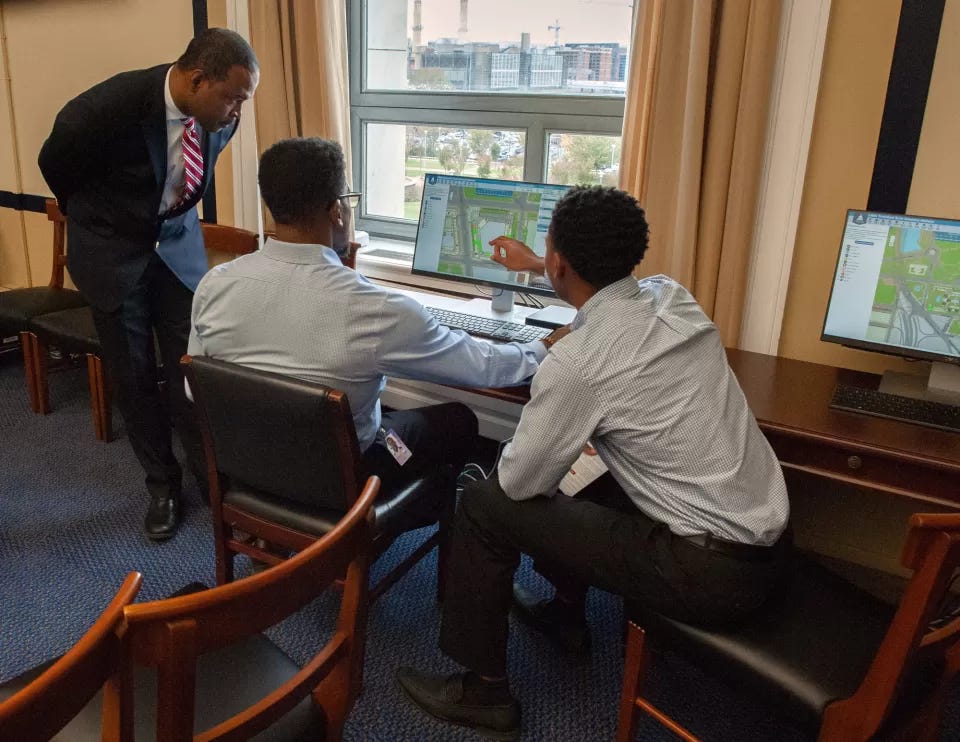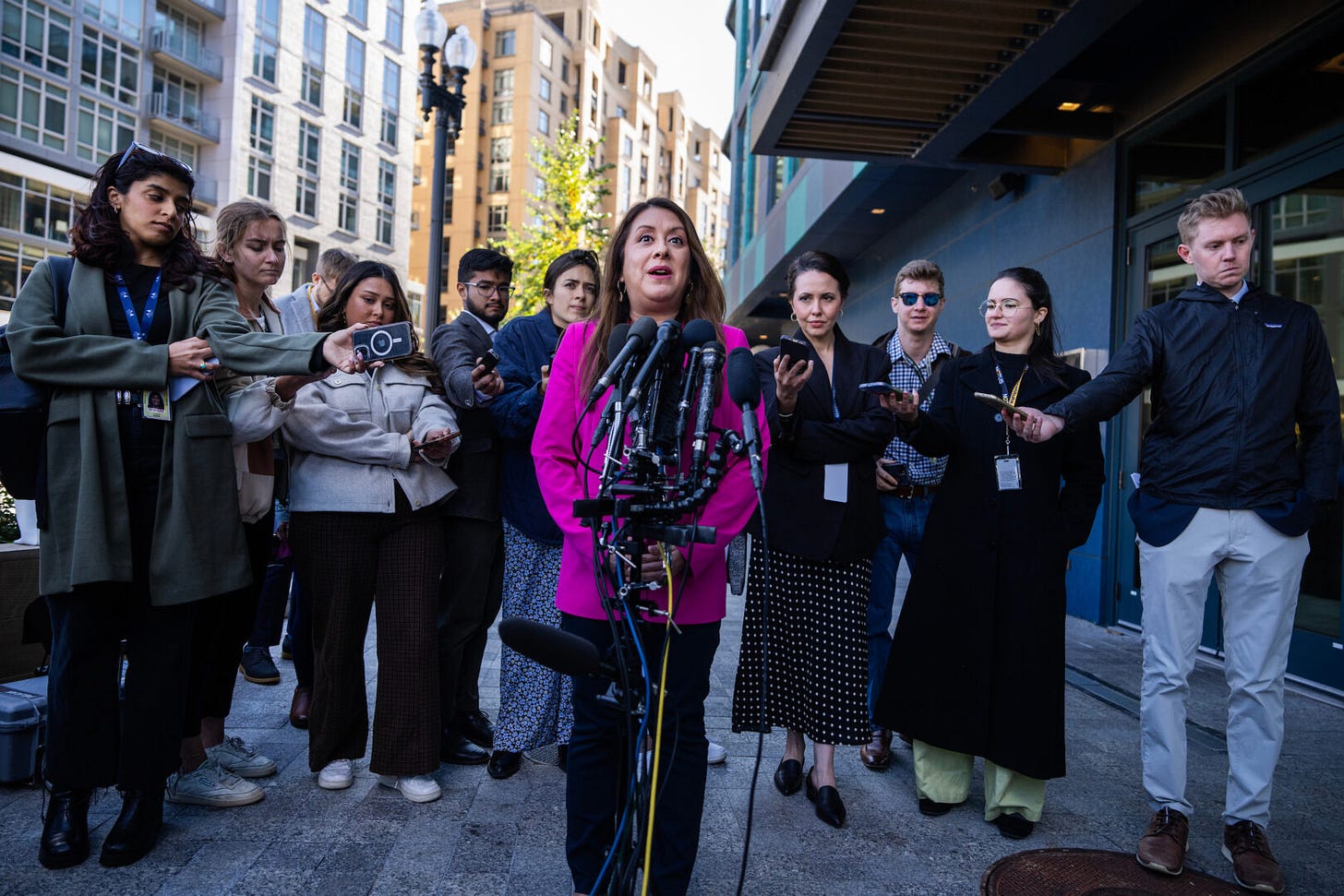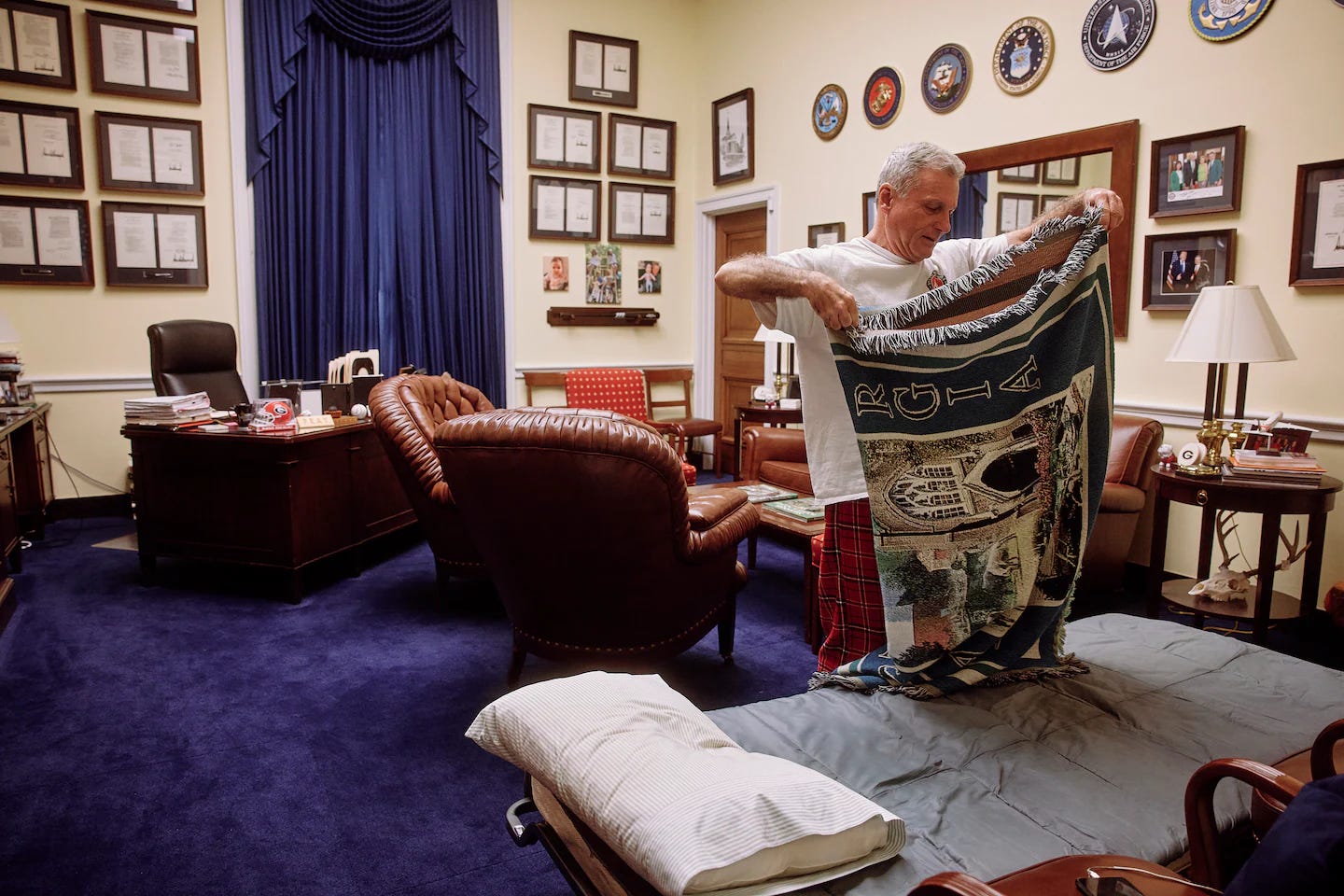The Congressional Lottery
It's not a hazing ritual, but it kind of looks like one
It was a tough, and at times, ugly election season. But last week, newly elected members of the House of Representatives walked past the grand Congressional chambers they’ll soon be haunting and headed to an underground room. There, they whooped and hollered for each other, even those of the opposing party, as everyone took turns pulling a number out of a large wooden box.
This wasn’t some hazing ritual. In fact, it’s a tradition that dates back to 1906: the office lottery ceremony. The number you pull could mean the difference between a cushy office close to the cafeteria, or one next to the janitor’s closet.
There are several large office buildings near the Capitol that house Congressional offices, including the 110-year old Cannon building that is currently undergoing a renovation project – meaning jackhammers and construction workers banging around while you're trying to meet with constituents. The Rayburn building, meanwhile, has offices with high ceilings and might, if you’re lucky, offer a view of the Capitol building itself.
Each new lawmaker pulls a number from the wooden box, and that number tells them the order in which they get to select their offices. Where your office is located matters. If you’re stuck at the end of one of the very long corridors, tucked way in the back, it’s much harder for someone to stop by for a quick chat. It’s easier for people to forget about inviting you to grab coffee if they never pass your door. And these relationships can be vital to getting things done.
Before any new members get to choose their office, current members who want to move to a better location get a chance to pick from the available offices. The Architect of the Capitol’s office has a website that allows members to view the floor plans, square footage, and window views of available offices.
Current members get to choose their new offices based on seniority. If more than one person with the same seniority wants to move offices, they draw a lottery number and get to choose a new space based on their number — but this is before any new members have the chance.
The representatives have fun with it, with some people bringing good luck charms – Representative-elect April McLain Delaney from Maryland brought an ultrasound showing her soon-to-be first grand baby – others dance up to the box or cross the fingers on one hand as they pull a number out with another.
Members have been known to do cartwheels for pulling a good number. California’s newly elected Sam Liccardo cheered members on as if he were watching a sporting event and everyone collectively groaned when Representative-elect Yevgeny Vindman from Virginia pulled the dreaded number 57.
His response? “I feel good about it. People remember either the first or the last. Everything in the middle, they forget. I’ve made my mark on Congress now, that’s it,” he said.
Once everyone pulled a number, they could go pick an office (usually they consider size as well as location), and head out to look at the tables set up showing various layouts, paints, carpet swatches and more that they could decide on.
New lawmakers will be sworn in on January 3. 2025. But they’re coming from all over the country with a range of experience. Some of them have never held elected office, while others have been in the political sphere for decades.
Incoming representatives all just got a brand new job in a new city. So they will have to:
Find somewhere to live in DC
Set up an office
Get to know hundreds of colleagues
Interview and hire a full staff
Learn about the legislative process
Both the Senate and the House offer new member orientation the week after the election to help with all this. The Senate orientation is shorter than the House's and less structured. It is more of a meet and greet and allows the new Senators time on Capitol Hill.
The House’s orientation is run by the House Administration Committee.
Rep. Bryan Steil, chairman of the committee, said, “A lot of information is coming at new members from an array of backgrounds. In many ways, that’s the strength of the House, is that individuals, men and women, come from a whole host of backgrounds, but to really come in and try to absorb as much information as you can, to be the best member and representative you can be of your respective district.”
This year, the freshman lawmakers got ten days of hands-on experience at Congressional orientation, including trainings on how to do everything on your to-do list, briefings, guest speakers, and tours. The committee also introduced an app that was automatically downloaded on the House-issued phones for new members, in order to bring New Member Orientation into the 21st century.
The app includes a map of House office buildings, information on the various training sessions and guest speakers, and lets them take notes and share documents (instead of carrying around binders full of paperwork like in previous years).
Lawmakers also get a chance to meet potential allies, talk policy strategy, and get to know the people they’ll be working with for the next two years. They get all their new technology (government-issued phones, computers, laptops, etc) and meet within their own caucuses (groups of lawmakers with shared goals). It’s a little like the first week of college.
Lawmakers have to keep a residence at home, but they also have to spend a lot of time in DC, which means paying for two places to live. DC has one of the most expensive real estate markets in the country, and Rep. Alexandria Ocasio-Cortez went viral in 2018 as a freshman lawmaker for saying she can’t afford to rent an apartment in DC until she got her first Congressional paycheck, which wasn’t expected for three months.
Some members have been known to take on some interesting sleeping arrangements in order to make their new job work. For example, former Rep. Dan Donovan told The New York Post one year that he had a cot that he would put in an alcove near his office. Former Rep. Lee Zeldin also would keep a bed in his office closet and pull it out at night.
Rep. Buddy Carter recently wrote an opinion piece for the Washington Post saying that more members of Congress should sleep in their offices, and that it would foster bipartisanship. He said that in the past, when it was far more difficult to travel home, members of Congress spent the weekends hanging out with each other in DC, and that they should do this more often. They might get more done.
How many incoming members of Congress will sleep in their offices remains to be seen. But they can all grab their keys at 8am on Jan. 3. Then, the real work begins.









Your description of the lottery for pick of your office brought some lightness to my morning.
Thanks for sharing this Sharon! This is the sort of thing I would bring up to my students when it was evident that the prevailing assumption was, "they're all a bunch of rich guys." That assumption was usually expressed following my lesson on the salaries of elected officials. Most students--having a pretty good idea of what their parents' earned--thought those salaries were too high. Then, I went into the details of their expenses. I also noted that many who serve in D.C. are giving up lucrative positions *back home.* I really wanted to stress to the kids that for most elected officials...it was a sacrifice in the quest of PUBLIC SERVICE. Regardless of one's position on the issues, I will hold steadfast my belief that the overwhelming majority of those who are elected to serve are honestly there to SERVE. At the very least, I believe we owe them the benefit of the doubt, until/unless they prove otherwise.